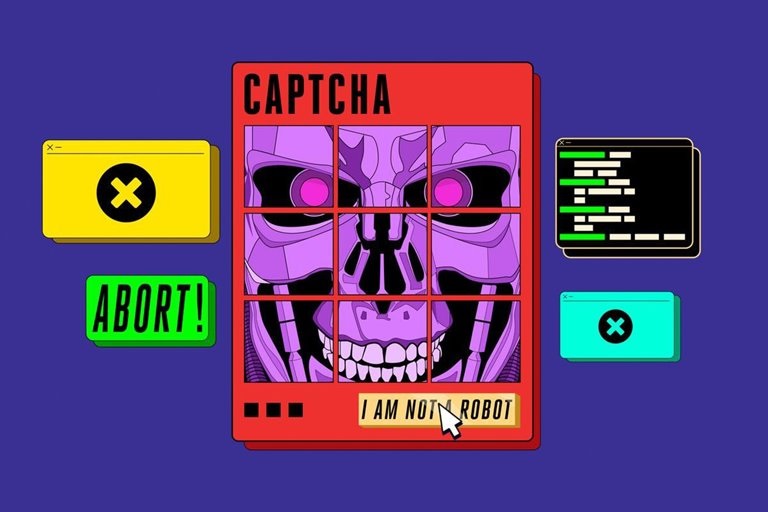Why Are Captcha Images Are So Depressing?
If You Have Not Thought About This Before, The Next Time You Have To Solve The Captcha Puzzle To Prove Your Humanity, Pay Attention To The Images That Google Shows You. Do Not These Images Depress One?
We can say with confidence that we all hate captcha. I mean the same Google security tool that detects humans from computers to prevent spam and other bot attacks on websites. Part of this hatred is due to the hassle of constantly recognizing objects in photographs; Objects that are sometimes really difficult for us to recognize, confident in our humanity!
Traffic lights, stairs, pedestrian crossings, hills, and buses are so blurred in the images that even when we are sure we have chosen all the images correctly, Captcha still tells us we have made a mistake. We have to repeat this tedious process to be able to search.
The other part of this hatred, which some of us may not be aware of, is the valuable time that Google is taking away from us so that AI companies can upgrade their image recognition systems.
The story does not end here, and another annoying point about Captcha deepens our hatred of this security tool. The images used in Captcha are unbearably depressing and depressing.
Captcha images never show a happy and energetic view of human activity or lush and breathtaking forest and beach views. Instead, these images are just blurry, unnamed views of a city that seems to be a remnant of a nuclear explosion. Just look at the image below, which usually appears in captcha tests, to get the same result:
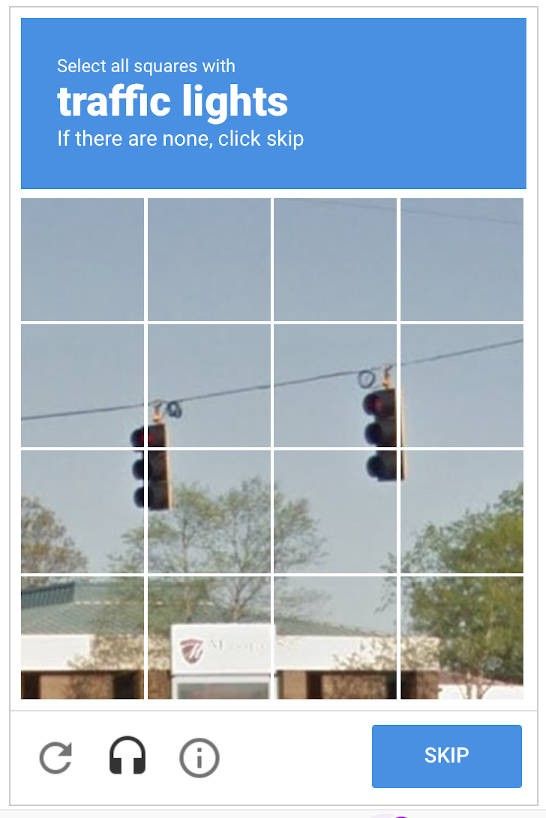
Looking at this image, it seems that all the sorrow and grief in the world pour into man’s heart. Even worse than this captcha is the separate and extremely depressing images that remind one of the apocalypses.
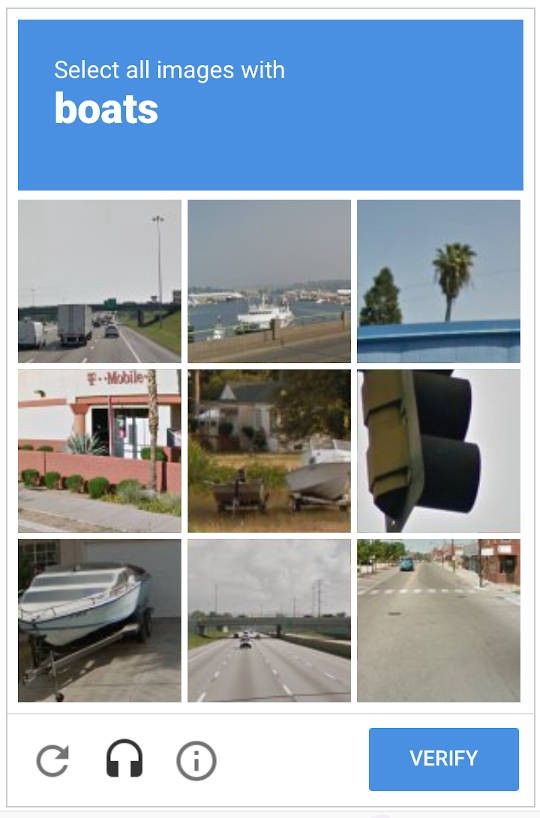
Seeing these sad sights of American cities makes our individual situation a little worse than before; But why are these images so frustrating? What features in these images make them look so dull and cold to our eyes? Of course, there are many reasons, and you may have noticed some of them yourself. However, here are six reasons why captcha images depress the user.
1. Captcha images are empty of humans
Captcha images are all taken from space; But the world they depict is anxiously devoid of human beings. Probably a factor as to why they’re doing so poorly. However, Google’s decision to remove humans from captcha images has left us with an apocalyptic world that makes us a little more anxious to watch. Each captcha depicts a world as if it were the victim of a neutron bomb explosion, with all human remains remaining; But no one survived the blast.
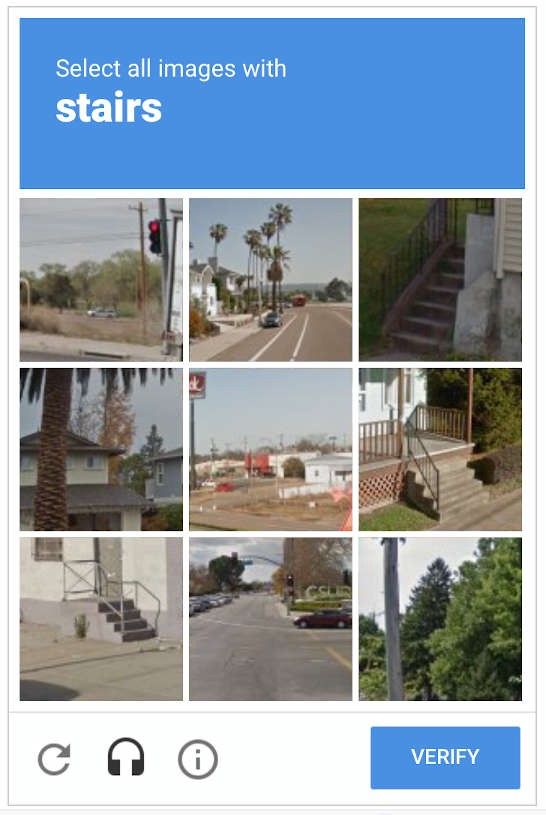
Even when it is seen in human images, it becomes somewhat scarier; Because of privacy, these people have been photographed from a great distance, so their faces are not recognizable. As a result, the few humans we see in captcha images are not unique. Where is the red-haired man going in the middle and bottom of the cap? Why are we watching him go?
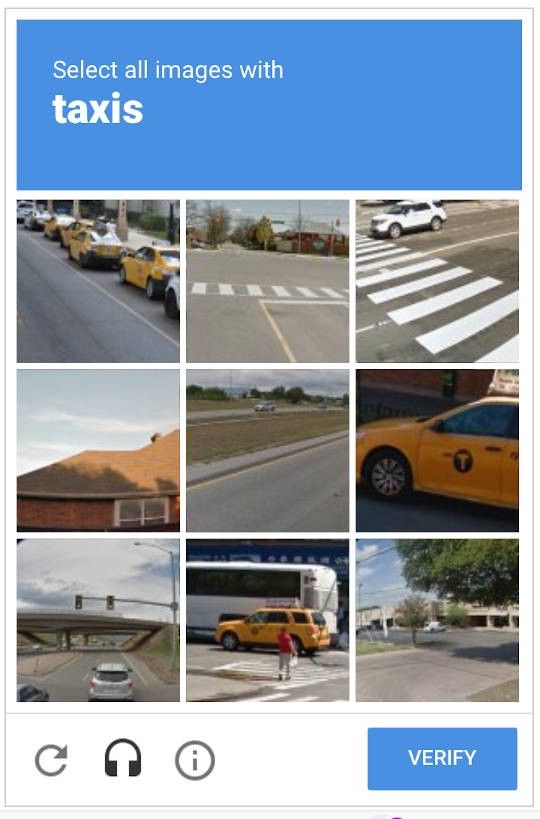
2. The angle of the captcha images is odd
Captcha images are often taken from strange angles that we humans have never chosen for photography. When you and I want to take pictures of a subject, we usually do so from our own perspective; While the camera of our hands and body is inherently involved in framing the facade. Nevertheless, captcha images have been taken to train driverless vehicles; For this reason, they look at the world from the perspective of cameras mounted on Google driverless test cars. Hence, the angle of these images seems strange to us humans. This is a very delicate point; But once we get our attention on it. Take a look at the angle of the photos below:
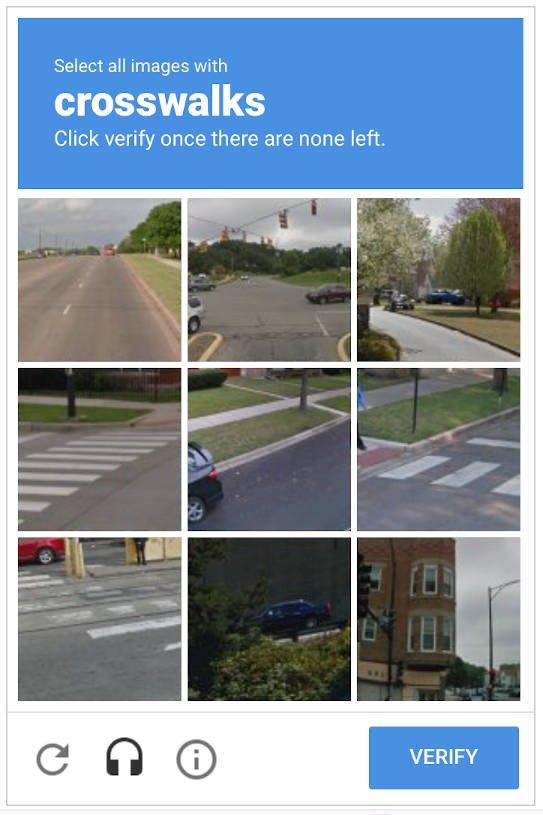
The above three images look relatively normal, But the pictures below are a bit strange. The middle image is not the angle at which you and I normally look at a car. Images of pedestrian crossing are also taken from an angle close to the human point of view, But it may be about 10 degrees different. It is as if a kind of imaginary valley has been created in the camera’s field of view, which is slightly different from it while resembling a familiar subject.
3. Captcha images seem to force us to watch private moments
Although captcha images do not show people’s faces due to privacy or the geographical location of the areas depicted in them is not clear, one feels that one is watching an image taken without the consent of its owners. Certainly, none of the people seen in the captcha images have been satisfied before, and watching these images makes the viewer feel bad. It’s as if we’re looking at buses and traffic lights from angles we’re not really supposed to be allowed to see.
4. The captcha images seem to have been taken from the crime scene
Google captcha images are often poor quality and out of focus. Probably because Google has removed all clear and easy images to reduce the risk of spam. However, the problem is that all the remaining images are of inferior quality and look like they are taken from crime scene videos. These images are reminiscent of videos recorded with CCTV cameras, and when we look at them, we feel as if something bad could happen to them at any moment.
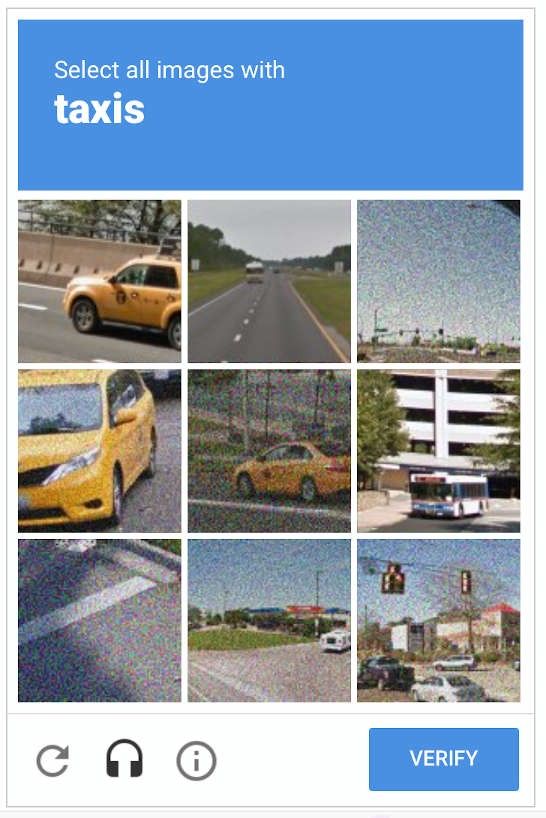
The images above are full of anxiety; For example, that middle taxi: what horrible thing is happening inside it and its destination? The image on the bottom right seems to have been taken from the wanted poster; But worst of all is the image on the bottom left: what horrible monster in Lovecraft’s world has cast such a shadow on the ground?
5. Gridlines of images are the way space creatures look at our human world
When the captcha is a view of a single image divided into sixteen smaller squares, seeing the white lines between them is disturbing; It is as if we are watching that image through the eyes of a space creature who is staring at the riddle of human life and trying to solve it. When Captcha asks us to identify visual components broken down into smaller pieces (for example, all the pieces that have a traffic light), it is actually turning our everyday reality into a puzzle that no ordinary person would look at as a puzzle. Does not. Perhaps these images are just a puzzle from the point of view of a space creature who does not know human life.
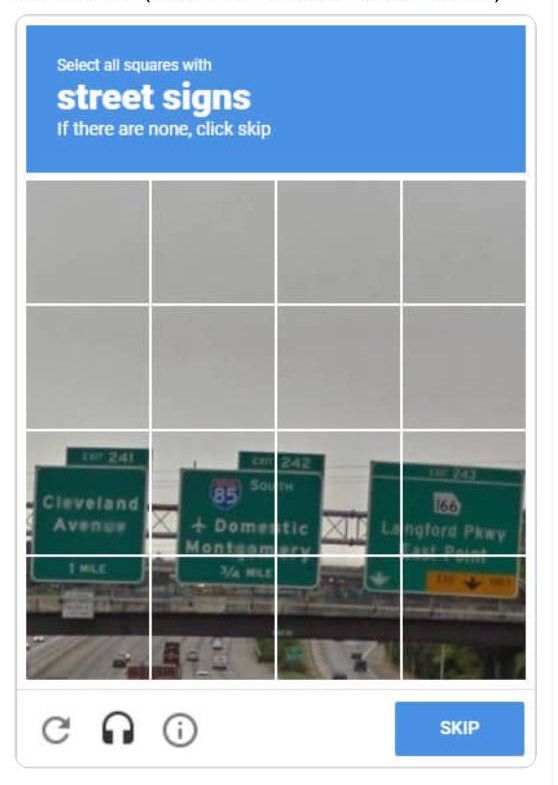
In other words, these images ask us to look at the world in the way that artificial intelligence looks, and this makes us feel like we are the kind of artificial intelligence that seeks meaning in this confusing world.
6. Natural landscapes play a small role in captcha images
Google Auto AI is only concerned with detecting objects in manufactured environments: red lights, taxis, bicycles, fire hydrants, or pedestrian lanes. This AI does not care about the beauty of trees or leaves, flowers, birds, rivers, or anything that makes people happy. Hence, the captcha images are a slide show of metal and concrete. It is as if someone has taken us to see a beautiful and scenic city, But let us look at fire hydrants or traffic lights.
Of course, there is an exception: sometimes Kapcha asks us to identify palm trees. It is not clear what the story of this exception is. Maybe one of Google’s driverless cars once hit one of these palm trees!
***
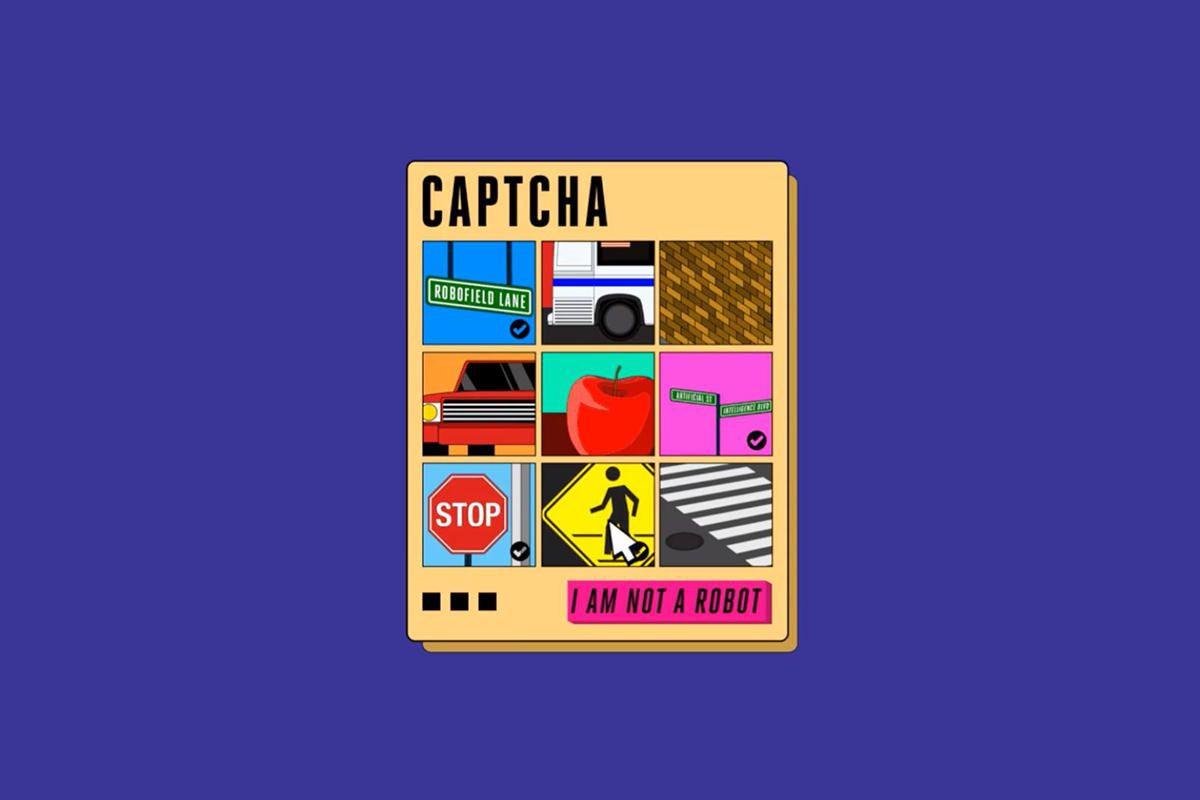
The story behind Google’s captivating images is as follows:
These images were not taken by humans and for humans; Rather, it has taken artificial intelligence and for artificial intelligence. For this reason, no trace of human characteristics or human audience can be seen in them. These images are made of industrial logic without flesh and blood. Captcha images force us to look at the world from the perspective of artificial intelligence. No wonder we feel depressed and numb every time we see them.
Some may be able to look at Google’s captcha system as art that frees us from the clutches of everyday life and forces us to look at the world through the eyes of a space creature. Many modern art styles create combinations from automation and random selection beyond the scope of ordinary human logic. However, there is a big problem with this: the captcha images are the product of $ 1.8 trillion. This makes it difficult for us to find artistic taste in these images.
***
Now, another question arises: what is the harm of constantly watching these images on the human race?
The security company of the Cloudflare website recently calculated that we humans spend a total of nearly 500 years every day watching captcha images! In the early 2000s, captcha images were a plain text that spambots still could not detect; But a decade later, these texts had to be cluttered and blurred so that text recognition software could not guess the correct answer; Software developed by the same people who had to answer the captcha questions.
In 2014, Google introduced one of its machine learning algorithms to compete with humans and asked them to identify one of Captcha’s obscure texts. Computers answered correctly in 99.8% of cases in this experiment and humans in only 33% of cases. So Google decided to go for Captcha Recap and Boring Images, Which are difficult for bats to recognize but relatively easy for humans.
Now, these images force us to look at the world around us in a different way; The way perhaps space creatures look at our world. Surely there is a strange irony in that robots force us to prove to them that we are human. Perhaps the captcha images secretly show us a vision of the future that robots will rule over humans.
The future in which we are under the complete command of artificial intelligence, and we have to get permission from artificial intelligence for anything we want to do and prove our identity to it. This view may be exaggerated and full of paranoia, But this is undeniable: Captcha images are really depressing and depressing!










